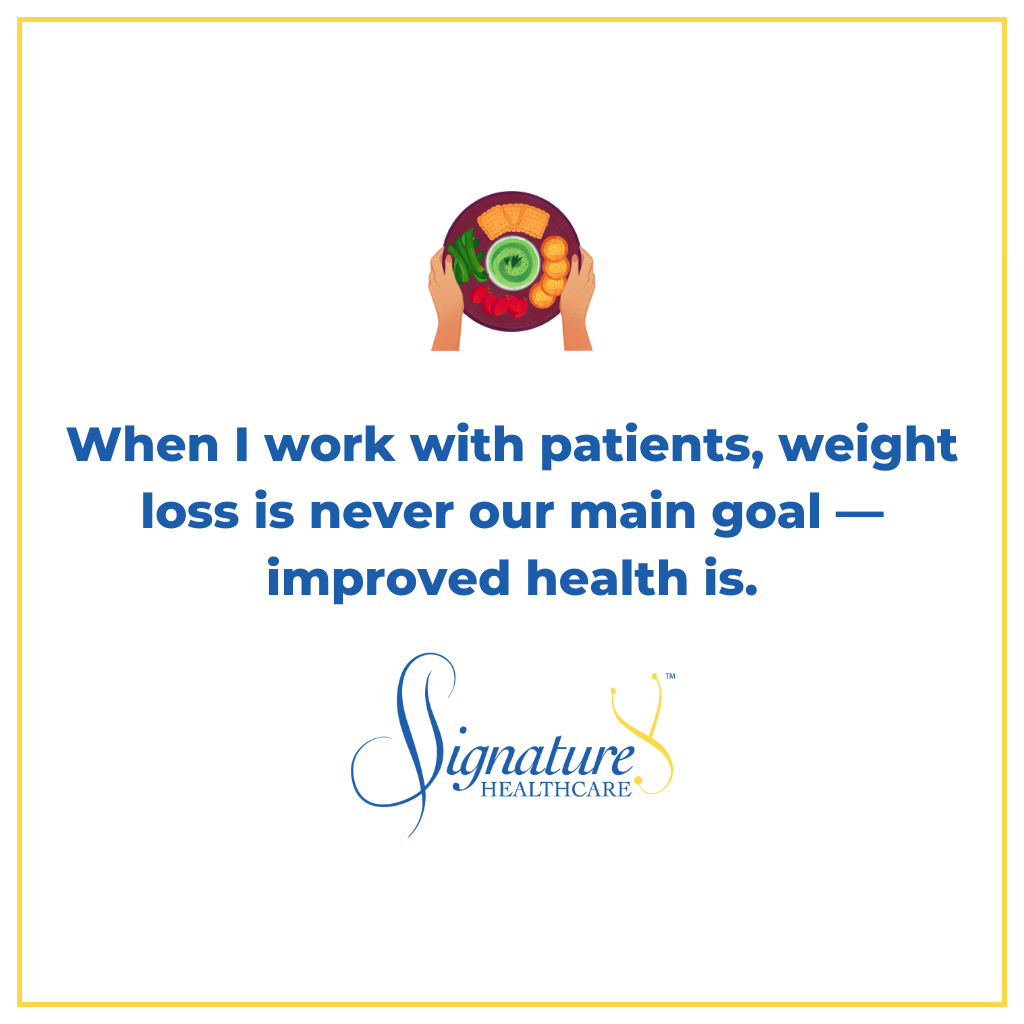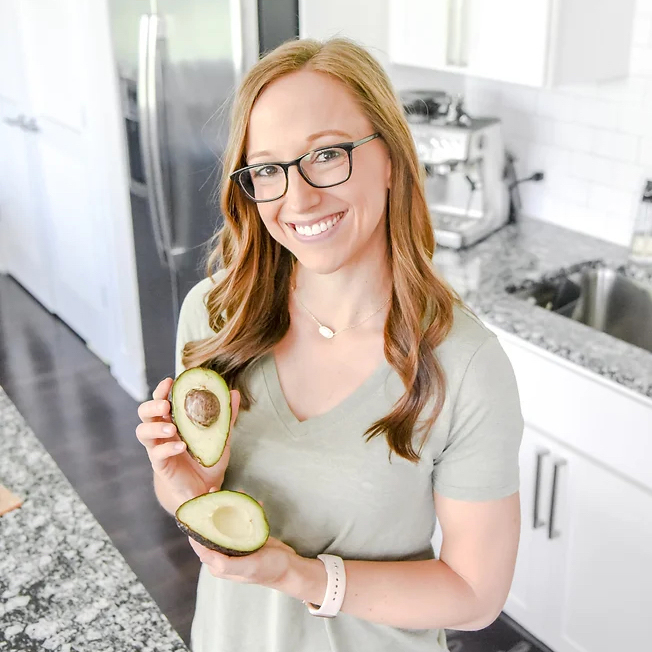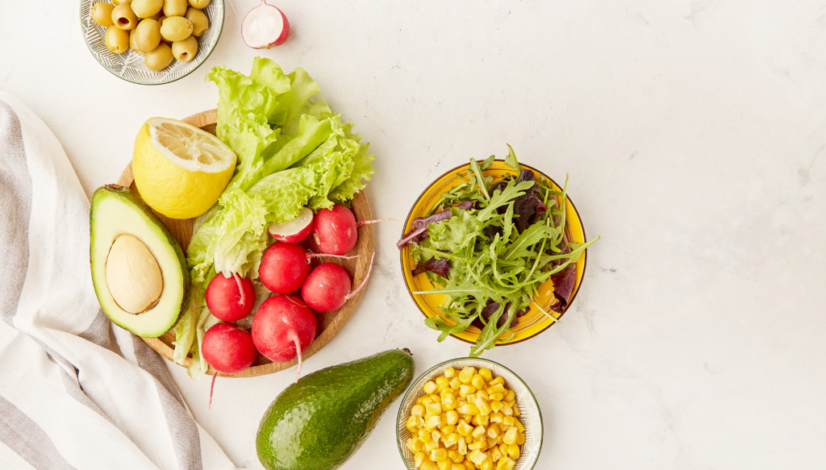‘What Diet Is Best for Me?’ A Dietitian Weighs In
Roughly half of all American adults would like to lose weight, which makes GLP-1 drugs like Ozempic and Wegovy seem attractive.
But not everyone who wants to shed some pounds needs help from a weight-loss drug. Every day, I help patients build good nutrition habits to lose weight in a healthy, sustainable way — without medication.
People dread the thought of “dieting.” The question “What diet is best for me?” conjures the idea of deprivation — a list of “do nots” monitored by the food police.
So, I encourage my patients to think of changing their eating habits not as dieting but as lifestyle changes grounded in good nutrition practices. This reframe helps patients achieve better health and weight-loss success without prescribed drugs.

Nutrition and Weight Loss
Proper nutrition — giving the body the fuel it needs to thrive — is a key piece of the weight-loss puzzle. If you want to feel energized and stay satiated throughout the day, you must consume adequate protein, fiber, and other nutrients.
And nutrition isn’t just about how much you eat; it’s about the quality of your food as well. Being mindful of how often you’re consuming fried, fatty foods and added sugars is important not only to help shed extra pounds, but also for inflammation and overall health.
Simple Habits Make a Difference
When I work with each patient, weight loss is never our main goal — improved health is. Weight loss, reduced cholesterol, and reduced blood pressure are simply side effects of the sustainable lifestyle changes my patients make. So, the next time you wonder, “What diet is best for me?” Here are the three most effective:
Practice Mindful Eating
Okay, is this the diet part? No, mindful eating isn’t about dieting, but it’s arguably the most important skill I teach patients:
- Throughout the day, tune into your hunger and fullness cues. After eating, consider how you feel on a scale of one to 10, with one being “still ravenous” and 10 being “stuffed like a Thanksgiving turkey.” Ideally, eat until you feel satisfied, not uncomfortably full — around a seven on the scale.
- Avoid “mindless” eating by eating intentionally. Instead of passively consuming your meal in front of the TV or while scrolling on your phone, be thoughtful about what you’re eating, when, and how. That way, instead of looking down at your empty plate and thinking, Where did it all go?, you’ll finish your meal consciously satisfied.
- If you finish your plate and still feel hungry, it could be because that “full” feeling hasn’t hit you yet. Ask yourself, Did I eat too fast? Could I stand to slow down in future meals? Was my plate missing a major macronutrient (protein, carbohydrate, fat)?
Control Food Portions
Portion control is an effective way to reduce your food intake. There’s no need to weigh food or count calories — try these approaches instead:
- Serve yourself intentional portions of meals and snacks.
- When we use larger tableware, we’re inclined to fill it up. Choose a small plate or bowl for your food to make a smaller portion appear more satisfying.
- Put the rest of the food away as soon as you’re served.
- Ask yourself if you really need, or even want, a second helping.
- Remember those hunger and fullness cues. Ask yourself:
- Do I really need a snack? Would a cup of water or hot tea satisfy me instead?
- Can I split dessert with my spouse or friend to satisfy my craving without feeling overly full?
Find Your Own Mediterranean Diet
You’ve likely heard of the Mediterranean diet — a lifestyle embracing a heart-healthy menu of vegetables, fruits, whole grains, beans and legumes, nuts and seeds, and healthy oils. It includes moderate amounts of dairy, lean meat, and fish and discourages processed or red meats and added sugars.
And it’s not a fad. People in the Mediterranean region have been following this approach to nutrition for over 5,000 years. It’s outlasted every trendy diet on the planet, and here’s why:
- The Mediterranean diet focuses on high-quality whole food groups that support weight control, heart health, and overall wellness.
- The Mediterranean diet emphasizes fiber, an ingredient most Americans don’t get enough of. Fiber is a catalyst for weight loss, as it helps you stay full for longer. It also helps keep your cholesterol and blood sugars down, while improving digestion.
- Besides weight loss, the Mediterranean diet targets many chronic health conditions that go hand-in-hand with excess weight, such as diabetes and heart disease.
So, the next time you ask, “What diet is best for me?,” consider applying Mediterranean diet concepts to your favorite type of cuisine. It’s easy to do — just use our guide:

Nutrition Tailored to You
In my dietary consultations at Signature Healthcare, I tailor custom nutrition plans to each patient. This involves:
- Asking the patient what they want to achieve and why
- Considering their physician’s recommendations for improvement
- Observing the patient’s readiness to make lifestyle changes
- Talking through the patient’s current food habits without judgment to identify areas of focus and opportunity
I encourage patients to go at their own pace when incorporating changes. If they only want to incorporate one at a time, great! If they want to incorporate several, that’s also great. Whatever works for them, and whatever will be the most sustainable long-term.
In terms of diet, whenever I recommend limiting consumption of a particular food that’s prominent in a patient’s diet, I always replace it with something else. This way, they feel less restricted than they do with a typical “diet.”
‘What Diet Is Best for Me?’
Here at Signature Healthcare, when you ask, “What diet is best for me?” you can rest assured the answer isn’t one size fits all. You deserve individual attention and a custom-made nutrition plan to help you achieve optimal health.
Effective, sustainable change takes time, patience, and sometimes trial and error, but with a well-thought-out strategy, those changes can transform not just your lifestyle, but your life.
Let’s get started. Reach out to schedule a nutrition consultation at Signature Healthcare.

Natalie Mokari, RDN LDN
Natalie Mokari is a skilled dietitian with a Bachelor of Science in Food Science and Human Nutrition from Clemson University, complemented by a dietetic internship in Charlotte. Her expertise spans outpatient clinical nutrition, private counseling, corporate wellness, and school food service, emphasizing a non-diet approach and mindful eating. Outside the clinic, she relishes trying new recipes, outdoor activities, traveling, and exploring Charlotte with her husband and dog.
Get the latest News
Join the Signature Healthcare Newsletter to get the latest articles, resources, and news delivered directly to your inbox.

